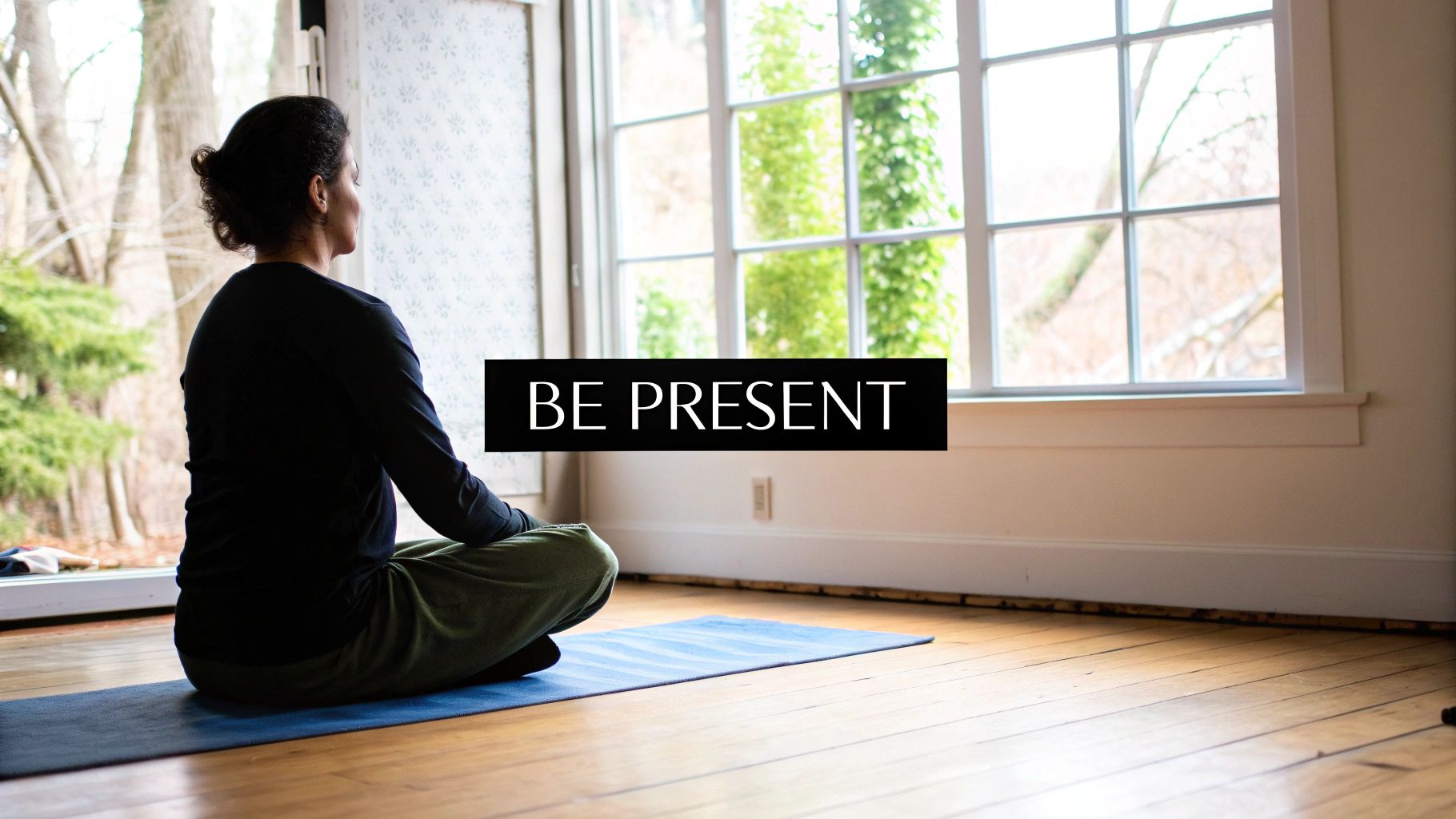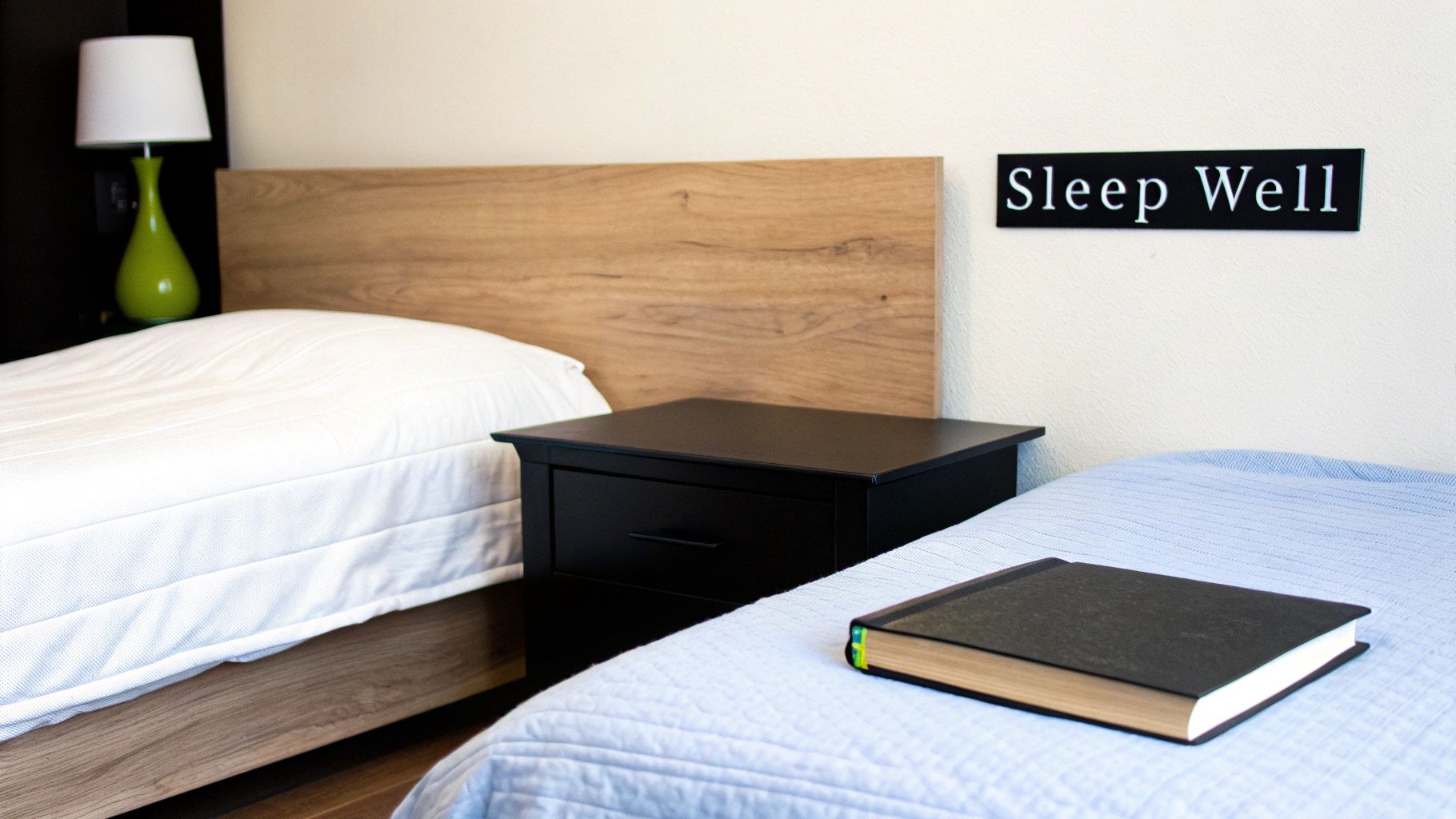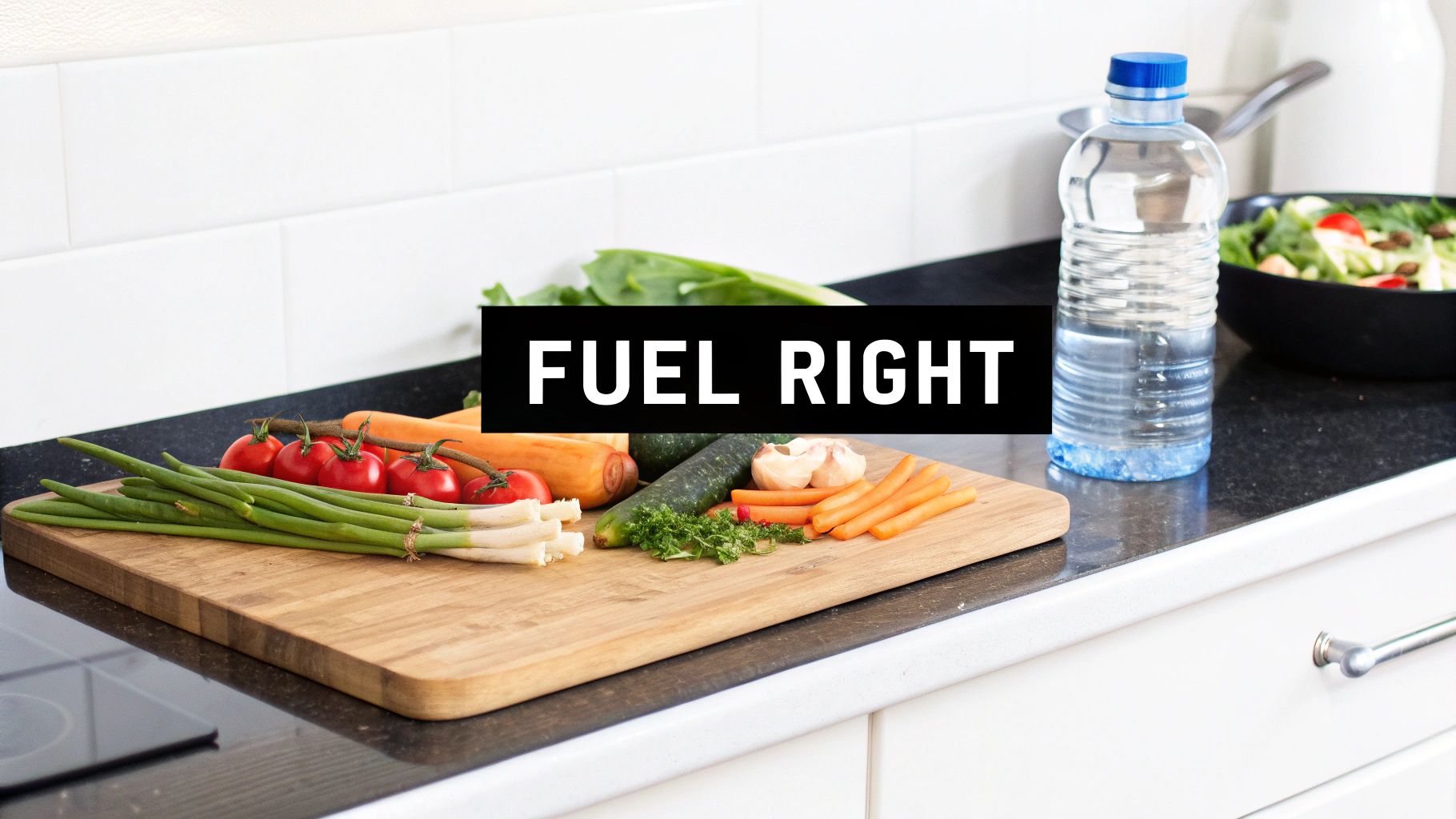free shipping at $99
free shipping at $99

In a world that constantly demands our attention, 'self-care' has evolved from a luxury to a fundamental necessity. But what does it truly mean to care for yourself daily? It's more than occasional indulgence; it's the consistent, intentional practice of nurturing your mental, physical, and emotional well-being. True self-care is about building a sustainable foundation that supports you through life's challenges and joys.
This guide moves beyond generic advice to provide a comprehensive daily self care checklist filled with actionable, evidence-based habits. We will explore seven foundational pillars of well-being, from the quiet power of mindfulness meditation and quality sleep to the vital importance of human connection and gratitude. To make these rituals feel truly special, we'll show you how to elevate each practice into a restorative experience. Simple moments can be transformed into luxurious escapes with sensory additions, like the fragrant ambiance of a Jackpot Candle.
Prepare to build a routine that not only sustains you but helps you thrive, one checklist item at a time. Beyond these specific habits, embracing a broader approach to your well-being involves exploring various life-changing self-improvement methods to support your personal growth journey.
Mindfulness meditation is the practice of anchoring your attention to the present moment. It involves observing your thoughts, feelings, and bodily sensations without judgment. Far from being a complex spiritual discipline reserved for monks, this ancient practice is a highly practical tool for modern life. Consistent daily practice, even for just five minutes, is scientifically proven to reduce stress, improve emotional regulation, and enhance overall mental well-being, making it an essential first step in any daily self care checklist.

The power of this practice is recognized by major institutions. Google developed its 'Search Inside Yourself' program to boost employee focus and emotional intelligence, while the U.S. military utilizes it to help service members manage PTSD. This widespread adoption underscores its effectiveness.
Integrating mindfulness into your routine is simpler than you think. The key is consistency, not duration.
Meditation is most effective when practiced proactively to build mental resilience, rather than just reactively during a crisis. A daily morning session can set a calm and focused tone for the entire day. An evening practice can help you decompress, process the day's events, and prepare for restful sleep. By making it a non-negotiable part of your self-care, you are investing in your long-term mental clarity and peace.
Quality sleep hygiene is a set of behavioral and environmental practices designed to promote consistent, restorative sleep. It treats sleep not as a passive activity, but as a critical pillar of health that requires active preparation. By optimizing your routines and environment, you directly influence your physical recovery, cognitive function, and emotional balance, making sleep hygiene a non-negotiable component of any effective daily self care checklist.

The profound impact of sleep is championed by experts and high-performers alike. Neuroscientist Matthew Walker brought the science of sleep to the mainstream, while elite athletes follow strict sleep protocols to maximize performance and recovery. Even corporations like Google recognize its value, installing nap pods to combat midday fatigue and boost productivity. This widespread focus highlights sleep as a cornerstone of well-being.
Creating a sleep-promoting routine is about consistency and creating powerful environmental cues for your body and mind.
Like meditation, sleep hygiene is most powerful when practiced proactively every single night, not just when you feel exhausted. A consistent bedtime routine trains your body for sleep, reducing the time it takes to fall asleep and improving the quality of that rest. By treating sleep as a sacred part of your self-care, you are investing in your energy, mood, and overall health for the day ahead. For more tips, you can explore habits to improve your sleep quality.
Regular physical exercise is structured activity performed consistently to improve health, fitness, and overall well-being. It goes far beyond aesthetics; it's a powerful mechanism for managing stress and boosting mood. When you engage in physical activity, your body releases endorphins, natural mood lifters, while also reducing levels of stress hormones like cortisol. This makes exercise a cornerstone of any effective daily self care checklist, offering profound benefits for both body and mind.

The world’s most innovative companies and healthiest communities recognize the non-negotiable value of movement. Patagonia famously encourages on-site yoga and surf breaks for employees, while the long-living populations in Blue Zones integrate natural movement, like daily walking, into their very way of life. This demonstrates that prioritizing physical activity is a key to sustained vitality and mental clarity.
Making exercise a consistent habit is about finding joy and building momentum, not pushing yourself to the brink from day one.
The best time to exercise is whenever you can do it consistently. A morning workout can energize you and set a positive tone for the day, boosting metabolism and focus. An evening session can be a fantastic way to shed the stress from work and prepare your body for a deeper, more restorative sleep. By integrating regular physical activity into your daily self-care, you are actively building a more resilient, energetic, and balanced version of yourself.
Nutritious meal planning and hydration are the cornerstones of physical self-care, involving the intentional preparation of balanced meals and consistent water intake. This practice is about fueling your body optimally, understanding that what you consume directly impacts your energy, mood, and long-term health. Prioritizing this element of your daily self care checklist provides the foundational energy needed to engage with all other aspects of your well-being, from mental clarity to physical activity.

This concept is championed by leaders in health and wellness, from the simple, powerful food rules of Michael Pollan to the longevity-focused dietary patterns of the Blue Zones. Major organizations like Whole Foods Market have even implemented employee nutrition programs, recognizing that well-nourished individuals are more productive and resilient. The core principle is simple: food is not just fuel, it is information that tells your body how to function.
Integrating mindful eating into your life doesn't require a complete overhaul. Small, consistent changes yield the most significant results.
Like meditation, nutritional planning is a proactive practice. It's about consistently providing your body with the building blocks it needs to thrive, not just reacting when you feel run down. A well-planned breakfast can stabilize blood sugar and improve focus, while staying hydrated prevents midday energy slumps. By making conscious food and water choices, you are actively investing in your physical vitality and mental sharpness, creating a resilient foundation for your entire self-care routine. You can discover more ways to incorporate healthy habits into your routine with our guide to a DIY spring spa day at home.
Gratitude practice is the conscious act of recognizing and reflecting on the good things in your life. It involves shifting your focus from what is wrong or lacking to what is present and abundant. This simple but powerful mental exercise, often done through journaling, is scientifically validated to rewire the brain for positivity, enhance feelings of happiness, and improve resilience against stress. Including this practice in your daily self care checklist is a direct investment in your long-term emotional health.
This practice's impact is championed by influential figures and institutions alike. Oprah Winfrey famously promoted her daily gratitude journal, linking it directly to her success and happiness. In the corporate world, Salesforce integrates gratitude into its wellness programs to foster a positive company culture, and positive psychology curricula in schools use it to build emotional well-being in students from a young age. This broad adoption highlights its universal and transformative power.
Making gratitude a consistent habit is about intention, not elaborate effort. The key is to find a method that feels genuine to you.
A gratitude practice can be a powerful anchor at any time of day. Starting your morning with it can set a positive and appreciative tone, helping you navigate daily challenges with a better perspective. An evening session allows you to reflect on the day’s highlights, no matter how small, and end on a note of contentment, which can improve sleep quality. By making gratitude a deliberate part of your self-care, you train your mind to actively seek out and acknowledge the good, building a foundation of lasting joy.
Digital boundaries involve the intentional setting of limits around your technology use, from social media to endless news scrolling. It’s about reclaiming your time and attention from platforms designed to be addictive. In a world of constant pings and notifications, creating this space is not a rejection of technology but a way to use it on your own terms. Consciously managing your screen time is a critical part of any modern daily self care checklist, as it protects your mental health and nurtures real-world connections.
The "Time Well Spent" movement, championed by figures like Tristan Harris, highlights how tech companies themselves implement digital wellness policies for their employees. This trend is mirrored by societal shifts, such as France's "right to disconnect" laws, which underscore the universal need to log off and recharge.
Creating a healthier relationship with your devices is about making small, intentional changes that stick.
Proactively managing your screen time prevents digital burnout, rather than just treating its symptoms like anxiety and poor focus. A key strategy is to replace scrolling with intentional, offline activities. For instance, instead of reaching for your phone in the evening, light Jackpot Candles’ Blueberry Muffin Jewelry Candle to fill your space with a comforting, nostalgic scent that encourages relaxation and presence. To further support healthy digital habits, consider how aids like blue light filter glasses can mitigate screen-related eye strain and improve sleep quality. By consciously curating your digital environment, you create more space for genuine rest and meaningful engagement with the world around you.
Social connection is the practice of intentionally cultivating meaningful relationships through regular communication and quality time. It’s about investing in the friendships, family bonds, and community ties that provide mutual support and emotional fulfillment. As social creatures, these connections are not just pleasant; they are a biological necessity for our well-being. Prioritizing these relationships is a powerful act of self-care and a crucial component of any daily self care checklist.
The profound impact of social ties is highlighted by Dan Buettner's "Blue Zones" research, which found that the world's longest-living people share a common trait: strong, supportive social networks. Similarly, the work of Brené Brown has popularized the idea that vulnerability and authentic connection are core to a wholehearted life. This isn't just theory; it's a fundamental aspect of human health.
Building and maintaining relationships requires conscious effort, but it can be seamlessly woven into your life with small, consistent actions.
While it’s natural to seek support during difficult times, the greatest benefits come from proactively nurturing relationships. Regular, positive interactions build a foundation of trust and intimacy that strengthens your resilience. A weekly dinner with loved ones can provide a consistent source of joy and belonging, while joining a local group based on a hobby introduces new energy and perspectives. By actively investing in your social well-being, you are building a vital support system that enriches every other aspect of your life.
| Practice | Implementation Complexity 🔄 | Resource Requirements ⚡ | Expected Outcomes 📊 | Ideal Use Cases 💡 | Key Advantages ⭐ |
|---|---|---|---|---|---|
| Mindfulness Meditation | Low - beginner-friendly | Minimal - no equipment needed | Stress reduction, improved focus & emotional control | Individuals seeking mental clarity and stress relief | Accessible, scientifically validated, adaptable |
| Quality Sleep Hygiene | Moderate - lifestyle adjustments | Moderate - environment & routine | Better cognitive function, mood, immunity | Those needing consistent restorative sleep | Strengthens health, improves daily energy |
| Regular Physical Exercise | Moderate - scalable intensity | Variable - may need equipment | Chronic disease risk reduction, enhanced mood & cognition | Health-conscious individuals & fitness enthusiasts | Longevity benefits, natural antidepressant effects |
| Nutritious Meal Planning & Hydration | Moderate - planning & prep skills | Time and cost for quality foods | Stable energy, immune support, chronic disease risk lowered | Those wanting optimal nutrition and weight management | Mental clarity and physical health support |
| Gratitude Practice & Journaling | Low - easy to start | Minimal - basic journaling tools | Increased happiness, improved relationships | Anyone aiming to boost positivity and resilience | Enhances life satisfaction, low barrier to entry |
| Digital Boundaries & Screen Time | Moderate to High - discipline | Minimal - apps or settings | Reduced anxiety, better sleep, improved focus | Individuals facing digital overload or distractions | Protects mental health, enhances presence |
| Social Connection & Relationship | Moderate - emotional effort | Time and emotional energy | Longevity, emotional support, reduced depression | Those seeking deeper relationships and support | Builds belonging and improves mental health |
Navigating the demands of modern life requires more than just getting through the day; it requires a commitment to nurturing your own well-being. The comprehensive daily self care checklist we've explored is not meant to be another list of chores. Instead, view it as a vibrant palette of possibilities from which you can paint a life rich with balance, joy, and resilience. True, sustainable self-care isn’t about grand, infrequent gestures. It’s found in the small, consistent acts of kindness you show yourself every single day.
The real power lies in personalization. Your ideal self-care routine will look different from anyone else’s, and it should evolve as your needs change. Perhaps your focus this week is on establishing better sleep hygiene, while next month you might prioritize reconnecting with friends. The key is to listen to your body and mind, responding with intentionality rather than simply going through the motions. This is the essence of building a personalized ritual of well-being.
The transition from reading about self-care to living it begins with a single, manageable step. Don't try to overhaul your entire life overnight. Instead, choose one or two practices from our list that resonate most deeply with you right now.
Self-care is a dynamic conversation with yourself. It’s about asking, "What do I need right now?" and having the courage to provide it without guilt.
Remember, the items on this daily self care checklist, from mindful movement to digital detoxing, are interconnected. Improving your sleep will boost your energy for exercise, and practicing gratitude can strengthen your social connections. By starting small, you create a positive ripple effect that touches every area of your life. This journey is an investment in your most valuable asset: you. The return on this investment is not just improved health, but a profound sense of inner peace and a greater capacity to navigate life's challenges with grace and strength.
Ready to elevate your daily self-care rituals into truly luxurious experiences? Discover how a simple flame can ignite a moment of tranquility and surprise with Jackpot Candles. Explore our collection at Jackpot Candles and find the perfect scented candle to transform your home into a sanctuary, complete with a beautiful jewelry surprise waiting inside.
Comments will be approved before showing up.